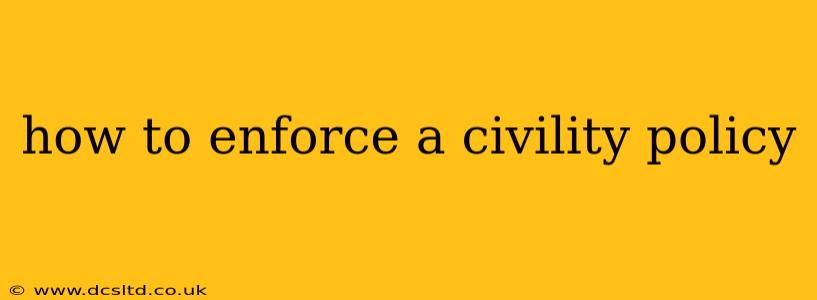How to Enforce a Civility Policy: Creating a Respectful and Productive Environment
Maintaining a respectful and productive environment, whether online or in person, requires a robust civility policy and a clear plan for enforcement. This isn't just about avoiding conflict; it's about fostering a culture of mutual respect and understanding. This guide will outline strategies for creating and enforcing a successful civility policy.
1. Defining Your Civility Policy: What Does "Uncivil" Look Like?
Before you can enforce a policy, you need a clear definition. What constitutes uncivil behavior in your specific context? Your policy should explicitly outline unacceptable conduct, including but not limited to:
- Personal attacks: Insulting, belittling, or threatening individuals.
- Hate speech: Language targeting individuals or groups based on their race, religion, gender, sexual orientation, disability, or other protected characteristics.
- Harassment: Repeated unwanted contact, intimidation, or abusive behavior.
- Disruptive behavior: Interrupting meetings, dominating conversations, or deliberately derailing discussions.
- False or misleading information: Spreading misinformation or deliberately sharing inaccurate data.
- Cyberbullying: Online harassment, including stalking, spreading rumors, or sharing private information.
- Flaming: Engaging in hostile or aggressive online exchanges.
It's crucial to be specific. Avoid vague terms; instead, provide concrete examples of unacceptable behavior. This ensures everyone understands the expectations and leaves less room for misinterpretation.
2. Communicating Your Civility Policy Effectively
A strong policy is only as good as its dissemination. Make sure your policy is:
- Easily accessible: Post it prominently on your website, intranet, or in any relevant physical spaces.
- Clearly written: Use plain language that's easy to understand for everyone, regardless of their background.
- Regularly reviewed: Update the policy as needed to reflect changes in your environment or emerging issues.
- Acknowledged: Require individuals to acknowledge their understanding and agreement to the policy. This can be done through a signature, an online agreement, or other appropriate methods.
3. Establishing a Clear Enforcement Process
This is where the "how to" comes in. Your enforcement process should be fair, consistent, and transparent. Consider these steps:
- Reporting mechanism: Provide multiple ways for people to report violations (e.g., email, online form, designated contact person).
- Investigation: Establish a process for investigating reported violations. This might involve gathering evidence, interviewing witnesses, and reviewing relevant documentation.
- Consequences: Outline the consequences of violating the policy. Consequences should be proportionate to the severity of the offense and could include warnings, temporary suspensions, permanent bans, or other disciplinary actions. Be sure these are clearly defined within the policy itself.
- Appeals process: Allow individuals to appeal decisions if they believe the enforcement was unfair or unjust.
- Documentation: Maintain thorough records of all reported violations, investigations, and disciplinary actions. This is vital for accountability and to demonstrate consistency in enforcement.
4. Training and Education
Don't just hand out the policy and expect compliance. Provide training and education to help individuals understand the policy and its importance. This could include:
- Workshops or seminars: Interactive sessions to discuss the policy and answer questions.
- Online modules: Self-paced training for individuals to complete at their convenience.
- Regular reminders: Periodically remind individuals about the policy and its importance.
5. Frequently Asked Questions (FAQ) about Enforcing a Civility Policy
H2: What if someone repeatedly violates the policy?
Repeated violations should result in progressively stronger consequences. A first offense might warrant a warning, while subsequent violations could lead to suspension or termination. Consistency is key to maintain the integrity of the policy.
H2: How do I deal with anonymous reports?
Anonymous reports can be challenging, but it's crucial to take them seriously. While you may not be able to fully investigate without identifying the reporter, you can still use the information to identify patterns of uncivil behavior and address systemic issues.
H2: How do I handle disagreements between individuals?
Encourage direct communication and conflict resolution whenever possible. Mediation or facilitated discussions can be helpful in resolving disagreements constructively. However, if the disagreement involves violations of the civility policy, the enforcement process should be followed.
H2: What if the enforcement process is challenged legally?
Ensure your policy and enforcement procedures align with relevant laws and regulations. Consult legal counsel if needed to ensure compliance and minimize legal risks.
By implementing a comprehensive civility policy and meticulously enforcing it, you create a positive and productive environment where everyone feels respected and valued. Remember, consistency and fairness are key to success.
